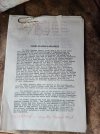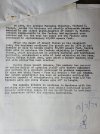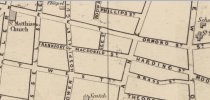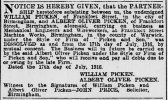WriteTheBook
Matthew
Hello, I hope I can re-ignite this Frankfort Street thread (edit - this new thread started for Matthew Picken). I'm Sara and I'm writing a family saga based on my 3 times great grandfather Matthew. He set up a business in Frankfort street when, I believe, it was named MacDonald Street. He started working for Joe Murdoch in 1822 and went on to set up the family business, Picken and Son, in 1854.
Census' show that he lived at 148 MacDonald Street and started as a machinist under Joe Murdoch. The Census' then show him moving to 151 MacDonald Street and later 152 MacDonald Street. Moving forwards to the 1990s, the company went into receivership but took up a good area of space on what is now Frankfort Street.
I'm trying to figure out HOW Matthew grew his business from starting in the back yard of a house to a full factory development. Were they back to back houses in the higher numbers? I've seen threads from people living in numbers 50+ but no one lived in the 140s. I can't see how he could have set up business 'in the back yard' of a back to back.
My book is fiction, based on fact, but I'd like to get this right because I believe this is a remarkable story. Matthew walked aged 10 from Kemberton in Shropshire in 1822, and found work in MacDonald Street. He went from poverty creating a family business which spanned over 200 years and 6 generations. I just feel it's worth getting this as right as I can get it!
I'd be very grateful for tips on how to tackle the library for deeds or documents on the street and its houses.
Census' show that he lived at 148 MacDonald Street and started as a machinist under Joe Murdoch. The Census' then show him moving to 151 MacDonald Street and later 152 MacDonald Street. Moving forwards to the 1990s, the company went into receivership but took up a good area of space on what is now Frankfort Street.
I'm trying to figure out HOW Matthew grew his business from starting in the back yard of a house to a full factory development. Were they back to back houses in the higher numbers? I've seen threads from people living in numbers 50+ but no one lived in the 140s. I can't see how he could have set up business 'in the back yard' of a back to back.
My book is fiction, based on fact, but I'd like to get this right because I believe this is a remarkable story. Matthew walked aged 10 from Kemberton in Shropshire in 1822, and found work in MacDonald Street. He went from poverty creating a family business which spanned over 200 years and 6 generations. I just feel it's worth getting this as right as I can get it!
I'd be very grateful for tips on how to tackle the library for deeds or documents on the street and its houses.
Last edited by a moderator:





